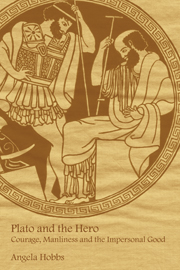Book contents
- Frontmatter
- Contents
- Acknowledgements
- Preface
- Glossary
- 1 The puzzle of Plato's thumos
- 2 Thumos, andreia and the ethics of flourishing
- 3 Arms and the man: andreia in the Laches
- 4 Odd virtue out: courage and goodness in the Protagoras
- 5 Why should I be good? Callicles, Thrasymachus and the egoist challenge
- 6 Heroes and role models: the Apology, Hippias Major and Hippias Minor
- 7 The threat of Achilles
- 8 Plato's response: the valuable as one
- 9 Alcibiades' revenge: thumos in the Symposium
- Epilogue: The weaver's art: andreia in the Politicus and Laws
- Bibliography
- Index
2 - Thumos, andreia and the ethics of flourishing
Published online by Cambridge University Press: 01 October 2009
- Frontmatter
- Contents
- Acknowledgements
- Preface
- Glossary
- 1 The puzzle of Plato's thumos
- 2 Thumos, andreia and the ethics of flourishing
- 3 Arms and the man: andreia in the Laches
- 4 Odd virtue out: courage and goodness in the Protagoras
- 5 Why should I be good? Callicles, Thrasymachus and the egoist challenge
- 6 Heroes and role models: the Apology, Hippias Major and Hippias Minor
- 7 The threat of Achilles
- 8 Plato's response: the valuable as one
- 9 Alcibiades' revenge: thumos in the Symposium
- Epilogue: The weaver's art: andreia in the Politicus and Laws
- Bibliography
- Index
Summary
PLATO'S ETHICAL FRAMEWORK
Let us return to the passage with which this book opened. At Gorgias 500c, in response to Callicles' trenchant attack on philosophers as unmanly wimps, Socrates issues a challenge of his own:
So you see how our discussion concerns that which should be of the greatest importance to any person, even if he has only a modicum of sense – that is to say, how one should live.
An almost identical claim is made in Republic 1. At 352d Socrates says that they must study Thrasymachus' attack on conventional justice with great care: ‘For our discussion is not about some trivial question, but about how one should live’.
This question of how best to live is, I would suggest, Plato's fundamental ethical starting-point. As we have seen, the question of which way of life is best runs throughout the Republic, and we shall find that it provides the basic structure of all the dialogues we shall consider. In the Gorgias, for instance, Socrates stresses again at 487a that he and Callicles are concerned with ‘how to live correctly’, and at the end of the dialogue he concludes that they now have some evidence that ‘the philosophic way of life is best’.
- Type
- Chapter
- Information
- Plato and the HeroCourage, Manliness and the Impersonal Good, pp. 50 - 75Publisher: Cambridge University PressPrint publication year: 2000

